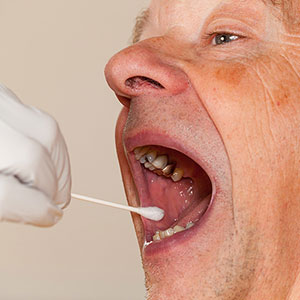Signs and Symptoms or Oral Cancer
Mouth cancer can occur anywhere in the mouth, including the lips, tongue and throat, as well as the salivary glands, pharynx, larynx and sinuses. And because early detection is crucial in overcoming this disease, you’ll want to visit your doctor immediately if any of the following symptoms persist for more than two weeks:
- Sores, swellings, lumps or thick patches anywhere in or around your mouth or throat
- Areas of red or white lesions in your mouth or lips
- The feeling of a lump or object stuck in your throat
- Swellings that make wearing dentures uncomfortable
- Numbness, pain or tenderness anywhere in your mouth, including your tongue
- Pain in one of your ears but without any loss of hearing
- Trouble moving your jaw or tongue, or problems with chewing, swallowing or speaking
- Loose teeth with no apparent dental cause
- Lingering sore throat or hoarseness

